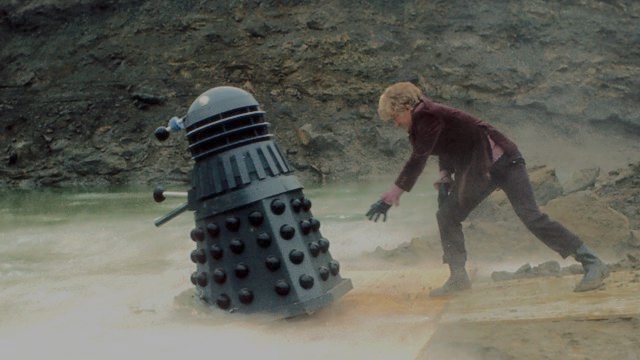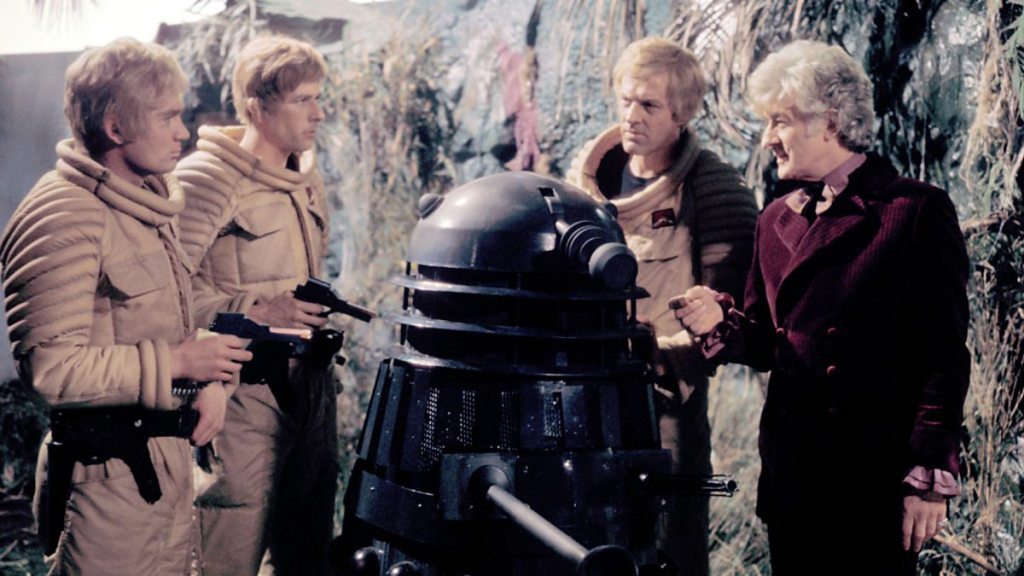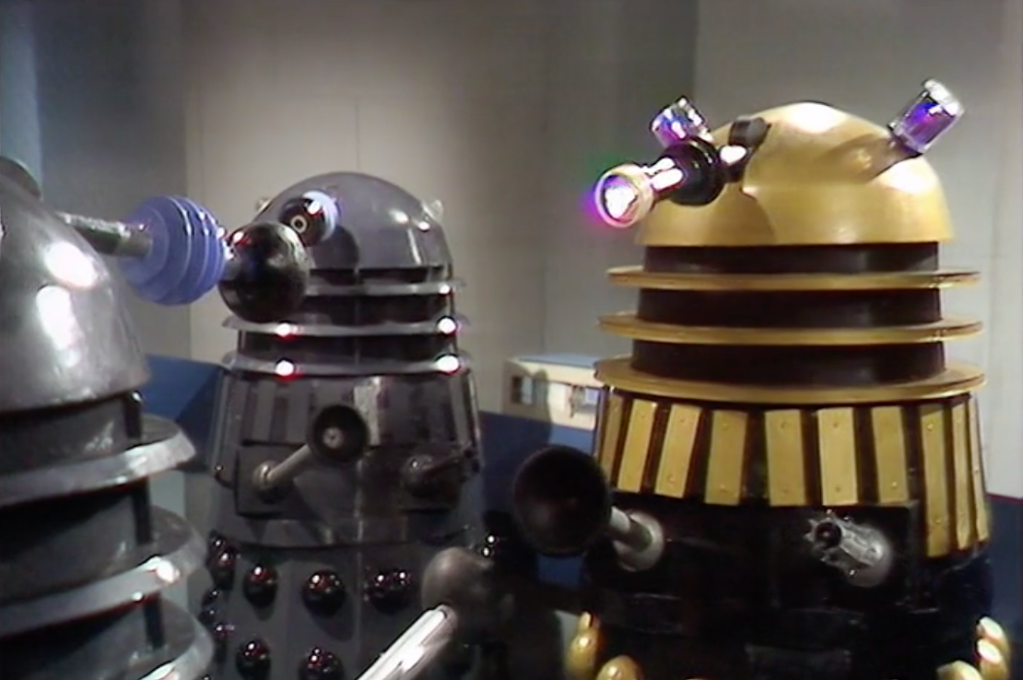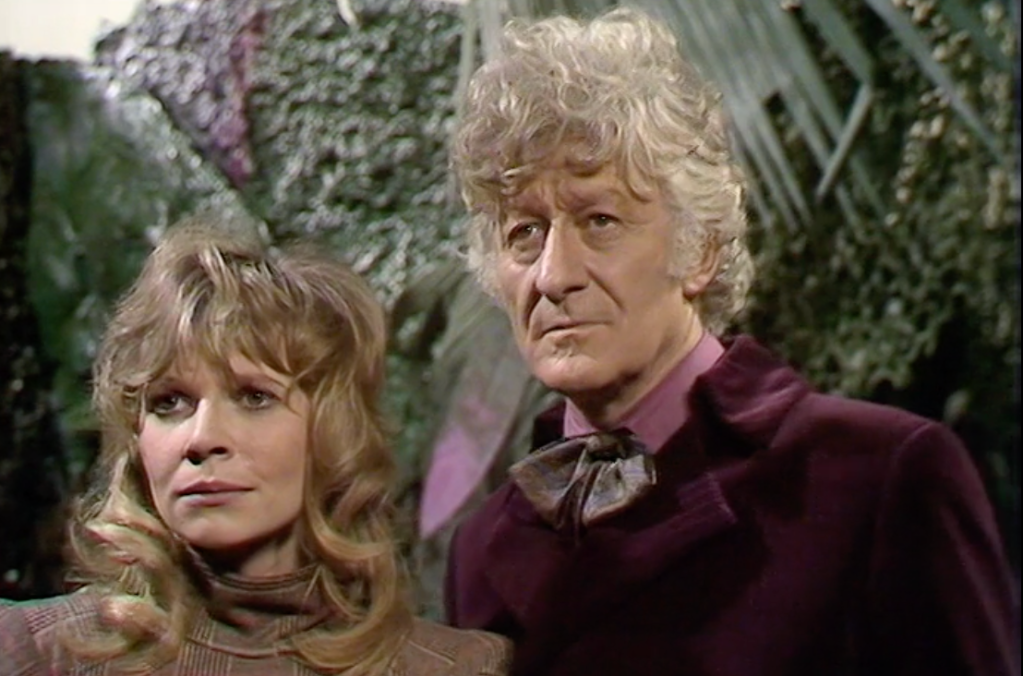
Somewhere on this planet there are ten thousand Daleks!
It is 1973, it is the 10th anniversary of ‘Doctor Who’. It is also the 10th anniversary of the creatures that gave ‘Doctor Who’ it’s longevity. Oh and the writer who pretty much defined what ‘Doctor Who’ would become. So, it is only fitting that the Daleks should be invited to the party, along with the writer who created them.
If in a lab you could take all of the elements that make up 60’s and 70’s Doctor Who and run them through a distillation process and produce a pure essence of classic ‘Doctor Who’ –what would come out of the end of that process would be something very similar to ‘Planet of the Daleks’. It is possibly the most Doctor Who-ish story ever. I can’t think of a story that epitomises classic ‘Doctor Who’ more than this one. The Doctor and his plucky assistant land on a dangerous alien planet, in a jungle filled with deadly plants and creatures, they are separated, find help from both the locals and the ‘rebels’. The rebels don’t really want to fight, but things are so desperate they embark in what is a suicide mission in a rickety spaceship. There are ventilation shafts, tunnels, a daring escape up a lift shaft using a makeshift parachute, invisible Daleks, Daleks on anti-grav discs, a gold Dalek supreme and a really nice feint or change of direction, we think it is about the Daleks simply experimenting on the locals to be able to master invisibility, but that switches to a Dalek army waiting for the war from the previous story frozen underground.
If in 10 years-time, Steven Moffat or RTD came back to write for the show as a one-off – I’d want the full-on Moffaty/RTD experience. Pull out all the tricks – show us what we’ve missed and that’s we get here from Terry Nation. Rather than in a rut – he is actually about to embark on a renaissance – ‘Genesis of the Daleks’, ‘Survivors’ and the first season of ‘Blakes’s 7’ – but that doesn’t fit the narrative. All because of a Terrance Dicks convention anecdote, which he repeated ad nauseum on every DVD documentary and commentary track. You know that story, the one about Terry Nation repeating himself, you know the one that it’s endlessly repeated, by someone who repeatedly reused his own plot elements. Much as I love Terrance, he wasn’t exactly immune to this himself – take a look at ‘The Eight Doctors’ or any if those other books where he reused elements from ‘The War Games’ or ‘State of Decay’ if you don’t agree. He also uses the anecdote affectionately and it is clear that he enjoyed working with Nation – using the other repeated phrase ‘good strong Terry Nation stuff‘ about his work.
So why do I like ‘Planet of the Daleks’? Well for all of those reasons really. I also think that David Maloney does a pretty good job of directing it, the regulars are on good form – particularly Katy Manning who is terrific and Jo gets some great stuff to do in this one – almost having a complete adventure on her own for much of it. But he can’t write for women apparently – despite Susan getting similarly good stuff in ‘The Daleks’ or Jenny and Barbara in ‘Dalek Invasion of Earth’ – or the female characters of Blakes 7 (Jenna, Cally, Servalan) or in particular ‘Survivors’ – Abby Grant being one of the strongest female roles in anything I can remember from the 70’s .
The guest cast are also pretty good – particularly perennial Maloney favourite Bernard Horsfall as Taron and Tim Preece as Codal and well the rest are fine – even Prentis Hancock as the annoying Vaber (he’s supposed to be) is just about bearable .The Thals do a pretty good job of balancing the fact that they feel they really have to do this, that the situation is desperate enough for them to give up their lives on this mission, but that they really don’t want to be there and really don’t want to fight. I find a rather lovely symmetry between this and ‘The Daleks’, in that in the original Dalek story we have the Doctor encouraging them to fight for almost entirely selfish reasons and in this we have the converse – the Doctor warning about the potential impact that returning heroes can have on other generations and the ‘glamour’ of war encouraging other generations to fight – he is urging them now to be peaceful, showing how far he has changed as well. I also like that this one mentions Ian, Barbara and Susan and that the events of ‘The Daleks’ are now part of Thal legend. In the programme’s TV history this is 10 years later and is one of the few times – ‘The Three Doctors’ being another in this tenth anniversary year – that says that this is all part of one story. It is a sign of the show developing its own mythology.
I’ve also seen the science questioned, but if you think icecanoes (cryo volcanoes) are preposterous, look up Enceladus:
http://www.bbc.co.uk/science/space/solarsystem/solar_system_highlights/cryovolcano
https://www.nasa.gov/mission_pages/cassini/whycassini/cassini20101214.html
https://www.nasa.gov/jpl/cassini/enceladus-pia18071
https://en.wikipedia.org/wiki/Cryovolcano
Nation wouldn’t have known anything about this, but it isn’t too great a stretch of the imagination or scientific plausibility to imagine natural phenomena that would involve plumes of a substance other than magma being emitted from the geology of another planet.

So what else – well rather than boring or a simple rehash – I find it an exciting, incident packed story – especially a rarity for a Pertwee 6-parter. It is very much a war story – the band of resistance fighters on enemy territory journeying to their objective against overwhelming odds to plant their bombs against the military aggressors. It is ‘The Guns of Naverone’, ‘Where Eagles Dare’ or ‘The Heroes of Telemark’. Along the way there are sacrifices to be made, heroism and lessons on bravery. When the pace should drop, Nation throws in the news of the massive Dalek army on Spiridon and the second group of Thals arrive, then again he drops in the deadly bacteria the Dales are cultivating and then again he raises it as the Dalek Supreme lands, ruthlessly destroys the Dalek commander and takes control.
He instinctively knows that with a 6-parter this raising of the stakes and threat is required to avoid the middle-episode holding pattern that other similar length stories are prone to. This isn’t ‘Resurrection of the Daleks’, where they just keep adding new unrelated plot strands, it is a raising of the stakes of the existing one. Nation doesn’t let the pace drop and when he has to resort to escape and re-capture – well, action adventure and jeopardy is his thing and in my opinion he does it a lot better than for example Mac Hulke – the escape up the lift-shaft in a makeshift parachute being a prime example. He also matches Hulke in at least making ‘we’re stuck in a cell’ interesting – the conversation with Codal on bravery and war for example.
CODAL: Why didn’t they kill us straight away, Doctor?
DOCTOR: Oh, I expect they’re saving us for interrogation. They’ll want to know what we’re doing on this planet. You know, what you did back there, leading the searchers away from us, was very courageous.
CODAL: I just didn’t give myself time to think. If I had, I certainly wouldn’t have taken the risk.
DOCTOR: Oh, I don’t know. I think you’re doing yourself rather an injustice there. If you hadn’t acted the way you did, we’d have all been captured. They give medals for that sort of bravery.
CODAL: Bravery? I’ve been terrified ever since I landed on this planet. It’s different for Taron and Vaber, they’re professionals. They’ve seen action before.
DOCTOR: And do you think they’re any the less brave because of that?
CODAL: They know how to deal with fear. They’re used to living close to death. I’m not. I’m a scientist, not an adventurer.
DOCTOR: Well, forgive me if I’m wrong, but aren’t you a volunteer?
CODAL: Yes.
DOCTOR: Then you must have known what you were getting into?
CODAL: No. None of us did. We’re not a warlike people, Doctor. We’ve only just developed space flight. No one had attempted a voyage of this length before, but every man and woman from my division volunteered. Over six hundred of them. You see, I didn’t even have the courage to be the odd man out. What are you laughing at?
DOCTOR: Ah, you, my friend. You may be a very brilliant scientist but you have very little understanding of people, particularly yourself. Courage isn’t just a matter of not being frightened, you know.
CODAL: What is it, then?
DOCTOR: It’s being afraid and doing what you have to do anyway, just as you did.
I like way that the Doctor takes Codal under his wing, encourages the young scientist, much as he once did Jo, who is now off having her own adventure with Wester and then Latep. It starts her journey towards leaving the Doctor in ‘The Green Death’. It is the section about the Thals and their courage that I really like. I also like the follow up – again this is not just a Pertwee ‘moment of charm‘ – it is a core value of the programme and a message from a generation of writers who grew up during the war and watched the men who fought returning home afterwards:
CODAL: You’ve done a lot for me, Doctor. Thank you.
CODAL: Thank you.
TARON: Doctor, we’d never have succeeded without all your help. I wish there was some way of thanking you.
DOCTOR: As a matter of fact, there is.
REBEC: Yes, Doctor?
DOCTOR: Throughout history, you Thals have always been known as one of the most peace loving peoples in the galaxy.
TARON: I hope we always will be.
DOCTOR: Yes, well that’s what I mean. When you get back to Skaro, you’ll all be national heroes. Everybody will want to hear about your adventures.
TARON: Of course.
DOCTOR: So be careful how you tell that story, will you? Don’t glamorise it. Don’t make war sound like an exciting and thrilling game.
TARON: I understand.
DOCTOR: Tell them about the members of your mission that will not be returning, like Maro and Vaber and Marat. Tell them about the fear, otherwise your people might relish the idea of war. We don’t want that.
If any of that doesn’t grab you, surely there is at least a laugh to be had about Jo being ‘Infected by the fungoids’? No? Please yourselves.

So, for me ‘Planet of the Daleks’ isn’t lazy or boring or a rehash of a 60’s Dalek story– it is the pure essence of the show. I find confusing the level of criticism aimed at something that is almost too good at being the thing it’s critics love. Is that it – is it too pure, too ‘on the nose’, too good at being Doctor Who – such that it appears derivative of itself? Do you need something else thrown into the mix, something more off-kilter or dystopian to enjoy this as a grown up? To make you feel better about liking a children’s show aged however old you are? This is ‘Doctor Who’ that the not-we think of (or at least thought of back in the 70’s) – Doctor Who versus the Daleks on an alien jungle world – whether we like it or not. Personally, I loved it as a 5 year old, liked it as a 25 year old when it was repeated and I still like it now – I’ve just finished it again, not sure how many times I’ve seen it now or read the Target book. But really, I love it because it is Doctor Who and the Daleks in an exciting, colourful adventure that I could watch and enjoy any rainy bank holiday or that would cheer me up if I was off work with a cold or just down in the dumps and feeling blue – sometimes that is enough for me.
There you go an impassioned defence of a story that probably wouldn’t make it into my top 100, but I like plenty of stories that are lower than that and I really don’t think deserves the kicking it has had more recently from fandom. The criticism is fine, it’s what fans do – analyse critically, but the level of criticism aimed at this one and Nation in particular that I just don’t really get. Each to their own – I won’t apologise for liking it at 5, 25 or 48, I don’t have to. If you don’t, well just one plea from me, when you return home after watching ‘Planet of the Daleks’ and tell people tales of your adventures and of Terry Nation – can you write a review without mentioning ‘lazy’, because that would just be lazy and we don’t want that.
